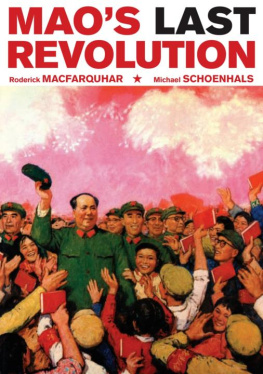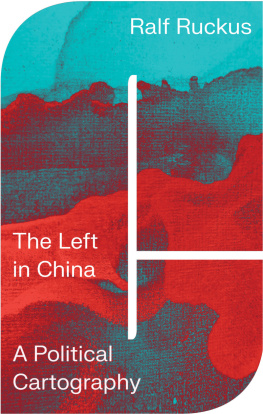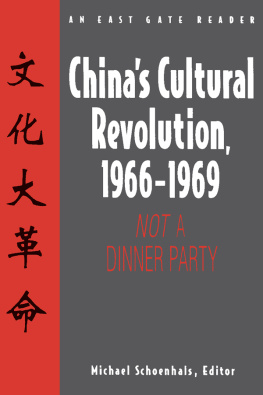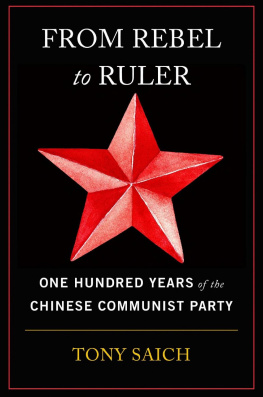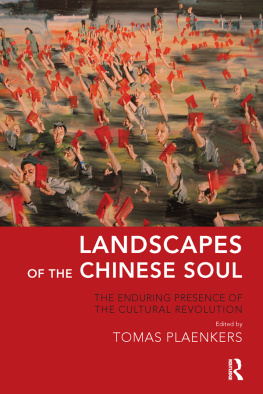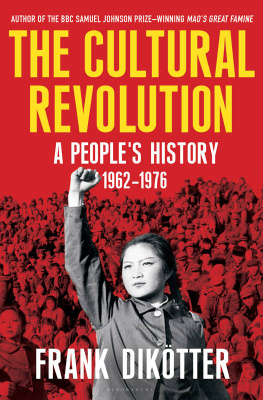
Mao's Last Revolution
Mao's Last Revolution

RODERICK MACFARQUHAR
MICHAEL SCHOENHALS



This work is dedicated to all Chinese whose works and words on the Cultural Revolution have enlightened usAnd to future generations of Chinese historians, who may be able to research and write on these events with greater freedom
Contents
ix
xiii
i
Illustrations follow pages 144 and336
Preface
This book has had a long gestation. I started chronicling China's Cultural Revolution (1966-1976) while it was taking place, for a variety of mainly British newspapers, magazines, and scholarly journals as well as BBC TV and Radio. In 1968, I began researching the origins of this political convulsion. Three decades later I published the last volume in what had turned into a trilogy on the subject. In the meanwhile I had joined the Harvard faculty, and shortly after I arrived there, in the mid-198os, a very distinguished historian asked me to give a course on the Cultural Revolution in a section of Harvard College's Core Program called Historical Study B. The formal remit of this section is to "focus closely on the documented details of some central historical event or transformation ... sufficiently delimited in time to allow concentrated study of primary source materials." My colleague explained that the assumption was that all the documentation was in and all emotion had been spent, thus providing the possibility of greater objectivity. I explained that very few reliable primary materials were available, and that in China, and even among some Western China scholars, emotions still ran deep over the events of the tumultuous Cultural Revolution decade. However, by this time I had taken on the co-editorship with John K. Fairbank of the final two volumes of the Cambridge History of China, covering the People's Republic of China, and had undertaken to write a chapter covering most of the Cultural Revolution period, and eventually I decided I might as well teach the course anyway. The course was unexpectedly popular and required a sourcebook of readings for the students. Preparing it, I found that most of the English-language materials had been written in the 1970s and early 198os, mainly on the basis of the materials issued during the Cultural Revolution by Mao and his victorious leftist coalition. Significant materials were finally beginning to emerge in Chinese to permit presentation of a more balanced picture of events, steering between the Scylla of the Maoist radicals and the Charybdis of the Deng-era survivors.
These materials informed the participants at a 1987 conference at Harvard's John K. Fairbank Center for East Asian Research, whose findings were published in New Perspectives on the Cultural Revolution, edited by William A. Joseph, Christine P. W. Wong, and David Zweig (Cambridge, Mass.: Council on East Asian Studies, Harvard University, 1991). But the new materials were of no use to the vast majority of undergraduates in my course who did not know Chinese.
From 1991 to 1997, sociologist Andrew Walder (now at Stanford), anthropologist James L. Watson, and I ran a project on the Cultural Revolution with a generous grant from the Luce Foundation. This enabled us to bring to the Fairbank Center a number of Western scholars and Chinese who had lived through the Cultural Revolution. The project included a conference on "The Cultural Revolution in Retrospect" convened by Andrew Walder at the Hong Kong University of Science and Technology in July 1996.
Among the Western scholars who joined the project at the Fairbank Center was Michael Schoenhals, whose earlier work on pre-Cultural Revolution politics had greatly impressed us when he was one of our postdoctoral fellows. Michael, who had been a student in China during the final year of the Cultural Revolution, combines superb language skills and meticulous scholarship with a bloodhound ability to find obscure but fascinating materials in the flea markets of urban China.
Michael and I discussed what we might do with the rapidly increasing Chinese documentation. We decided that we could best serve the wider scholarly and student community as well as a more general readership by writing a history of the Cultural Revolution. This book is the product of that decision. Michael prepared the first versions of the great majority of the chapters, which then went through a number of drafts. Administrative responsibilities in Cambridge, Stockholm-where Michael convened an international Cultural Revolution conference-and Lund dragged the process out. But we were encouraged by signs of renewed academic interest in the Cultural Revolution at other institutions; each of us gave a lecture in a year-long seminar course on the subject at the University of California, San Diego.
In the spring of 2003, Michael and I took advantage of the Radcliffe Institute's innovative Exploratory Seminar program, presided over by Katherine Newman, then its Dean of Social Science, and run by Phyllis Strimling. We presented a complete if not quite final draft to Merle Goldman, Nancy Hearst, Dwight Perkins, Elizabeth Perry, Lucian Pye, Anthony Saich, Stuart Schram, Ross Terrill, and Andrew Walder, and this work owes much to their informed and insightful comments. Nancy Hearst, with the unrivaled contacts she has built up as Fairbank Center Librarian and on her annual book-hunting visits to Beijing, provided me with the latest books and magazines; later she did truly yeoman service in questioning the text, regularizing the notes, compiling the bibliography, and transforming English usage into American usage. Victor Shih read through a lot of recent issues of Chinese party history journals and provided me with excellent and useful synopses of relevant articles. On visits to China, I was fortunate to be able to have discussions with the few Chinese historians who have written about the Cultural Revolution and whose works are mentioned in our notes, and even with one or two significant participants in the events themselves.
When I finally handed our manuscript to Kathleen McDermott, the editor for History and the Social Sciences at Harvard University Press, she seemed pleased, tactfully concealing any surprise or relief she might have felt. After receiving positive feedback and suggestions from two anonymous reviewers-to whom we are most grateful-she put the impressive HUP machine into gear. Elizabeth Gilbert supervised the project with loving care, Ann Hawthorne edited the manuscript with speedy and patient efficiency, deadlines were met. Indexing was in the familiar and expert hands of Anne Holmes. On behalf of Michael and myself, I extend our warmest thanks to them and to other members of the HUP staff whom we expect to meet as the manuscript turns into a book looking for readers. At this point, over to Michael ...
... who, when Rod started researching the origins of the Cultural Revolution, was still in high school, dreaming of one day becoming the beatnik translator of Tang poetry in Jack Kerouac's novel Dharma Bums. Eight years later, in what our campus loudspeakers in Shanghai told us was the "tenth spring of the Great Proletarian Cultural Revolution," I found myself at Fudan University, learning by observing what mass politics Maoist style was all about. Nothing was further from my mind than one day coauthoring a history of the Cultural Revolution. Throughout the r98os, engaged in research in Europe and North America, first on the Great Leap Forward, then on CCP rhetoric and propaganda, my Shanghai experience was simply a reservoir of more or less outrageous stories with which at parties I was able to one-up fellow students from the United States who had arrived in China only after the Chairman was dead and gone.
Next page
